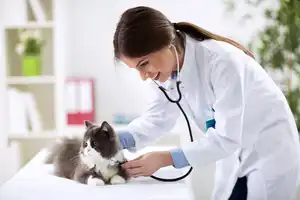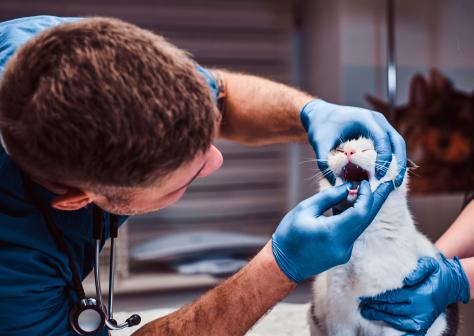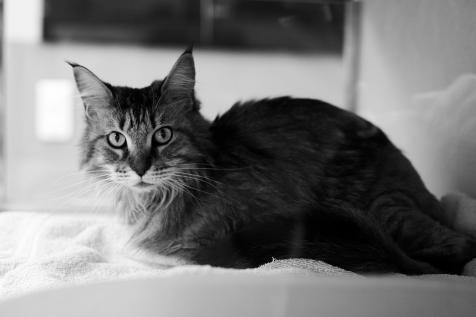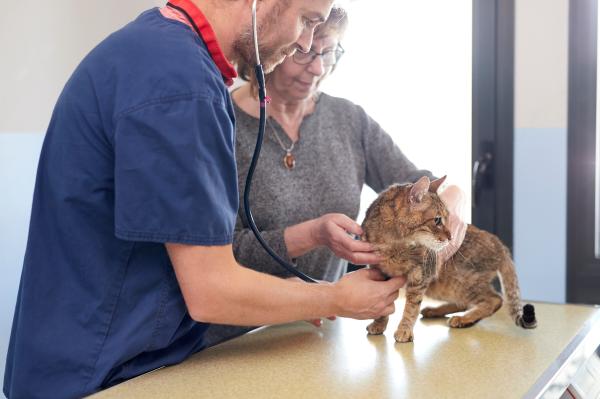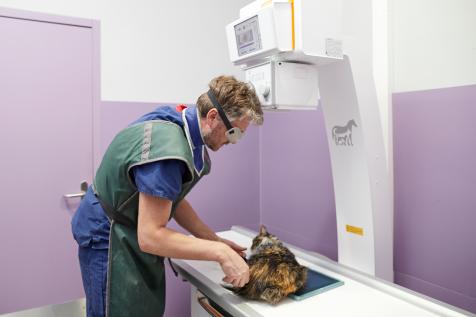Cat Nutrition
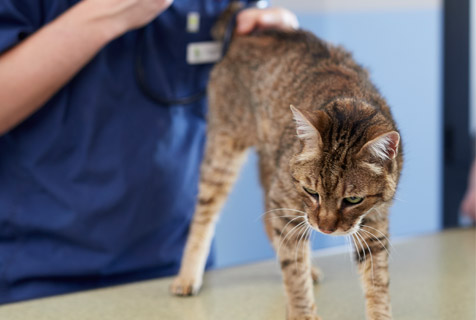
All animals need a well-balanced diet that is fed to meet their caloric needs. Obesity is one of the number one nutritional issue in cats which can also lead to other health issues. Cats are true carnivores and require animal protein in their diets because they do not have the ability to manufacture certain amino acids and vitamins. They also need other nutrients including fat, carbohydrates, fiber, vitamins, and minerals.
Protein
Dietary protein for cats should contain essential amino acids as well as non-essential amino acids. The essential amino acids are for synthesis of other proteins in the body, and the non-essential amino acids can be used for gluconeogenesis and/or energy for things like maintenance. Taurine is considered an essential amino acid in casts as they have minimal ability to synthesize it. There are higher protein requirements during time of growth, gestation, and lactation. Protein quality includes proteins that are easily digested and absorbed.1
Carbohydrates
Although there is no minimum level of carbohydrates needed in cat food, a diet too high in carbohydrates may have negative consequences. Some fiber may be beneficial. In some cases, supplemental fiber may provide gentle support for proper digestion. Fiber also promote the growth of good bacteria present in the lower portion of the digestive tract which may aid in digestive balance.
- There are two types of carbohydrates based on the solubility: 2Digestible (starches and sugars) provide energy and are stored in the liver and muscle as glycogen.
- Indigestible (fiber) which can impact stool quality and gut motility.
Dietary Fat
Fat in the diet not only is a source of essential fatty acids (EFAs) but also provides energy. Fat soluble vitamins (A, D, E, and K) can only be absorbed, stored, and transported by fat. Fat is also needed to make certain hormones and maintain cell membranes. Fat is a palatability factor and provides 2.5 times more energy than protein and carbohydrates, so it is easy to contribute to the obesity problem.3
Minerals and Vitamins
The major (macro) minerals needed by cats are calcium, phosphorus, potassium, sodium, chloride, and magnesium. There is a need to balance the amounts of mineral in the food as levels of one mineral in the food can impact levels of other minerals. The trace (micro) minerals are needed in smaller amounts and include iron, copper, zinc, and selenium.
Vitamins are nutrients needed in small amounts that enable many functions in the body. Some vitamins are manufactured in the body and some vitamins need to be supplied in the food and are found in the natural ingredients. They can also be added to the formulation to ensure adequate levels.4
Ingredients vs. Nutrients
Ingredients provide a balance of nutrients but should never be confused with the actual nutrition of a product. Ingredients should be selected for nutrients, quality, taste, and bioavailability of nutrients. No single ingredient, or lack of ingredient makes a pet food better or worse. It is the sum of all its parts. Some food will have functional nutrients added to the formulation. Functional foods are foods that have a potentially positive effect on health beyond basic nutrition.
Life Stage and Special Needs
The needed formulation for cat food will change based on various life stages or special needs. Kittens, and pregnant queens and lactating queens have different nutritional needs than adult cats. Food and feeding amounts are also dependent on lifestyle, activity levels and health status.5
References:
- Gross KL. Yamka RM, Kho C, Friesen KG (2010) Macronutrients. In Hand, Thatcher, Remillard, Roudebush, Novotny, (Eds), Small Animal Clinical Nutrition 5th Ed (pp81-96). Mark Morris Institute
- Gross KL. Yamka RM, Kho C, Friesen KG (2010) Macronutrients. In Hand, Thatcher, Remillard, Roudebush, Novotny, (Eds), Small Animal Clinical Nutrition 5th Ed (pp 66-81). Mark Morris Institute
- Gross KL. Yamka RM, Kho C, Friesen KG (2010) Macronutrients. In Hand, Thatcher, Remillard, Roudebush, Novotny, (Eds), Small Animal Clinical Nutrition 5th Ed (pp 96-104). Mark Morris Institute
- Wedekind, Kats, Yu, Paetau-Robinson, Cowell Micronutrients: Minerals and Vitamins. In Hand, Thatcher, Remillard, Roudebush, Novotny, (Eds), Small Animal Clinical Nutrition 5th Ed (pp 107-141). Mark Morris Institute
- Vogt, Rodan, Brown et al. AAFP–AAHA Feline Life Stage Guidelines. Journal of the American Anaimal Hospital Association 2010. pp70-85.


